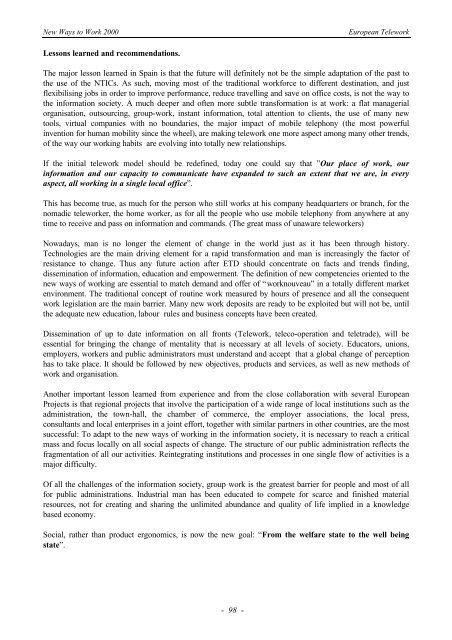eWORK 2000 - European Telework Week
eWORK 2000 - European Telework Week
eWORK 2000 - European Telework Week
- No tags were found...
Create successful ePaper yourself
Turn your PDF publications into a flip-book with our unique Google optimized e-Paper software.
New Ways to Work <strong>2000</strong><strong>European</strong> <strong>Telework</strong>Lessons learned and recommendations.The major lesson learned in Spain is that the future will definitely not be the simple adaptation of the past tothe use of the NTICs. As such, moving most of the traditional workforce to different destination, and justflexibilising jobs in order to improve performance, reduce travelling and save on office costs, is not the way tothe information society. A much deeper and often more subtle transformation is at work: a flat managerialorganisation, outsourcing, group-work, instant information, total attention to clients, the use of many newtools, virtual companies with no boundaries, the major impact of mobile telephony (the most powerfulinvention for human mobility since the wheel), are making telework one more aspect among many other trends,of the way our working habits are evolving into totally new relationships.If the initial telework model should be redefined, today one could say that ”Our place of work, ourinformation and our capacity to communicate have expanded to such an extent that we are, in everyaspect, all working in a single local office”.This has become true, as much for the person who still works at his company headquarters or branch, for thenomadic teleworker, the home worker, as for all the people who use mobile telephony from anywhere at anytime to receive and pass on information and commands. (The great mass of unaware teleworkers)Nowadays, man is no longer the element of change in the world just as it has been through history.Technologies are the main driving element for a rapid transformation and man is increasingly the factor ofresistance to change. Thus any future action after ETD should concentrate on facts and trends finding,dissemination of information, education and empowerment. The definition of new competencies oriented to thenew ways of working are essential to match demand and offer of “worknouveau” in a totally different marketenvironment. The traditional concept of routine work measured by hours of presence and all the consequentwork legislation are the main barrier. Many new work deposits are ready to be exploited but will not be, untilthe adequate new education, labour rules and business concepts have been created.Dissemination of up to date information on all fronts (<strong>Telework</strong>, teleco-operation and teletrade), will beessential for bringing the change of mentality that is necessary at all levels of society. Educators, unions,employers, workers and public administrators must understand and accept that a global change of perceptionhas to take place. It should be followed by new objectives, products and services, as well as new methods ofwork and organisation.Another important lesson learned from experience and from the close collaboration with several <strong>European</strong>Projects is that regional projects that involve the participation of a wide range of local institutions such as theadministration, the town-hall, the chamber of commerce, the employer associations, the local press,consultants and local enterprises in a joint effort, together with similar partners in other countries, are the mostsuccessful: To adapt to the new ways of working in the information society, it is necessary to reach a criticalmass and focus locally on all social aspects of change. The structure of our public administration reflects thefragmentation of all our activities. Reintegrating institutions and processes in one single flow of activities is amajor difficulty.Of all the challenges of the information society, group work is the greatest barrier for people and most of allfor public administrations. Industrial man has been educated to compete for scarce and finished materialresources, not for creating and sharing the unlimited abundance and quality of life implied in a knowledgebased economy.Social, rather than product ergonomics, is now the new goal: “From the welfare state to the well beingstate”.- 98 -








